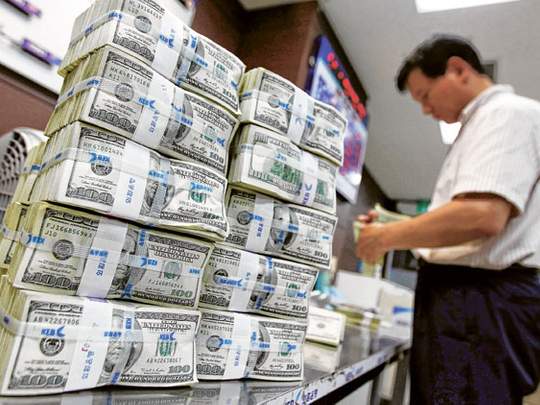
Dubai: UAE expatriates who are banking on the US dollar to gain more strength this year are not likely to get disappointed over the next few months, as the US dollar is tipped to strengthen further in 2017.
Various predictions are betting on the greenback to appreciate further against several currencies, including the euro, Indian rupee and Philippine peso in 2017. A higher dollar means foreign workers in UAE could send more money out of their monthly income.
Since early 2016, the American currency has been gaining significant momentum on the back of an improving US economy, interest rate hike expectations and Donald Trump’s promises to spend big on infrastructure projects.
The trade-weighted dollar index is at a 14-year high, closing at 128.7 on January 3, according to Markaz. The dollar is expected to be at its strongest in the first half of 2017 and then "fade away" in the remainder of the year.
As of Sunday, the Indian rupee was close to breaching the 20 exchange rate against the UAE dirham, at 18.56 - a huge fall in value from 16.8 almost two years ago. The Philippine peso, at the same time, depreciated to a little over 13.44 per dirham, compared to 11.9 in January 2015.
According to the latest report released on Sunday by the Bank of America Merrill Lynch, the US currency will likely strengthen further this year, with the euro-US exchange rate forecast to be around 1.02 in 2017 and the US-Japanese yen at 120.
“The market reaction following the US elections has been faster than expected and the [US dollar] could strengthen further,” the report by the bank’s global FX Research team said.
“In real effective terms, the USD is about 8 per cent above its 20-year average, bust still 8 per cent below its high of 2002.”
Raghu Mandagolathur, senior vice president for research at Markaz, said money outflows from the UAE are only expected to increase, along with the rise in the US dollar. "While low oil price has impacted remittance from the UAE on account of lower earnings, a strong dollar would negate the impact to a certain extent," Raghu told Gulf News.
"However, it should also be noted that a stronger dollar would mean higher import costs. Since the UAE depends on imports for most of the local consumption, a rising dollar would also signify an increasing import cost, thereby reducing the purchasing power."
The World Bank reported in April 2016 that remittances to developing countries, where a significant number of UAE expats come from, grew only marginally in 2015, as weak oil prices and other factors dampened the earnings of foreign workers. Officially recorded remittances to developing countries reached $431.6 billion in 2015, up 0.4 per cent over $430 billion in 2014.
There are, however, uncertainties to watch out for this year - which can impact the value of the US dollar against major currencies - and these are related to the implementation of policies under the Trump regime, replacement of the US Federal Reserve chair and outcome of the elections in some European countries.
“[The bank] expects substantial uncertainties this year, including negotiations for the US fiscal stimulus, which could be long and more difficult than markets currently expect. Trade protection remains a concern. Later in the year, [Janet] Yellen’s replacement [in the Federal Reserve] will become a key market theme.”
“Beyond the US, Europe is facing political tail risks, with elections in France, the Netherlands, Germany and possibly Italy. Geopolitical risks depending on the policies of the new US administration could be another blind spot, with hard to predict market implications.”
In its Capital Markets Outlook 2017, Deutsche Bank said it expects the euro to fall to 0.95 US dollars and thus below parity.
“[Donald Trump] will now have to show which measures he can in fact implement as president. It is clear that the US economy will benefit from his policy – at least temporarily,” said Oliver Rakau, senior economist at Deutsche Bank Research.





